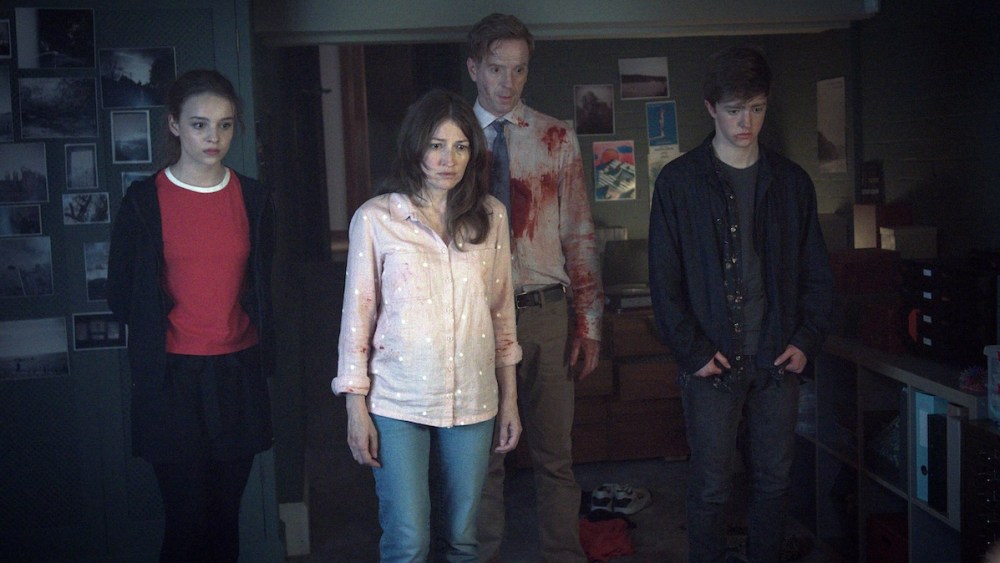A Tame Vampire Horror Comedy
Based on the novel by Matt Haig, “The Radleys” is a vampire horror comedy that can’t quite figure out its tone, so more often than not, it ends up in a lukewarm middle ground. The British production stars Damian Lewis and Kelly Macdonald as Peter and Helen Radley, bloodsucking parents in recovery, whose suburban normalcy can only cover for their hidden natures (and for their children’s burgeoning vampirism) for so long.
When their teenage daughter Clara (Bo Bragason) discovers her true self — in an uncomfortable scene of sexual violence turned on its head — the duo calls in Peter’s punk rock twin brother Will (also played by Lewis) for assistance, given his “active” vampire status. The characters usually refer to vampirism as a “family disease,” citing inherited cravings that alter their behavior and introducing a substance abuse metaphor in the process. Meanwhile, the couple’s gay son Rowan (Harry Baxendale) lusts quietly after his handsome neighbor Evan (Jay Lycurgo), setting up a further double entendre about vampires living in secret being akin to queer folks in the closet. However, these vague thematic allusions are about the movie’s only truly concise facets.
Right from its opening scenes, “The Radleys” is presented with an unobtrusive visual plainness, which never evolves, and often manifests as a lack of energy. The camera and editing seldom keep up with Keefus Ciancia’s genuinely propulsive and exciting score, creating an immediate disconnect between image and sound that can be hard to look past, further exacerbated by the dialogue. For instance, Rowan’s voiceover and observations made by neighbors refer to Clara as exceptionally pale, but there’s little discernible difference between her and the movie’s other white characters.
These malformed moments are practically endless. Evan’s father Jared (Shaun Parkes) has paranoid suspicions that the Radleys may be vampires, but his reasons are unclear since the family goes to great lengths to keep their identity a secret. The film’s patchwork use of vampire lore results in just as much confusion, since it pulls from some existing tropes (mind control, invitations to enter, an aversion to garlic) while randomly discarding others (a lack of reflection and burning up in the sunlight), but never meaningfully establishes its parameters, despite taking for granted its audience’s familiarity with modern vampire media. The aforementioned ideas are only set up right before they need to be paid off, resulting in fleeting referential comedy and only momentary drama.
The actors all put in tremendous effort, but the script doesn’t serve their talents. Lewis’ double duty as a buttoned-up doctor and his more free-spirited twin is imbued with just enough contrast to work. Of the entire cast, only Macdonald seems to truly tap into the addiction subtext, providing a messy and captivating performance that feels like it could fly off the rails at any moment. However, her immense restraint isn’t afforded a release valve at any point, causing her character to plateau.
Watching “The Radleys” yields disappointment after disappointment. It’s never scary, it seldom portrays a wider world outside its central household and its only laughs come from Lewis’ exaggerated reaction shots when Peter is exposed to blood. However, given the movie’s otherwise muted naturalism, it’s hard to tell if this was intended. For a movie steeped in familiar genre hallmarks, it lacks any spark of mischief or intrigue, and more often than not, it zig-zags away from nearly all the subplots it manages to establish. What vampirism means to any of its characters seems to change on a whim, whether the adults who slowly lose control or the adolescents in the throngs of personal discovery. What potential the movie has is quickly squandered.


